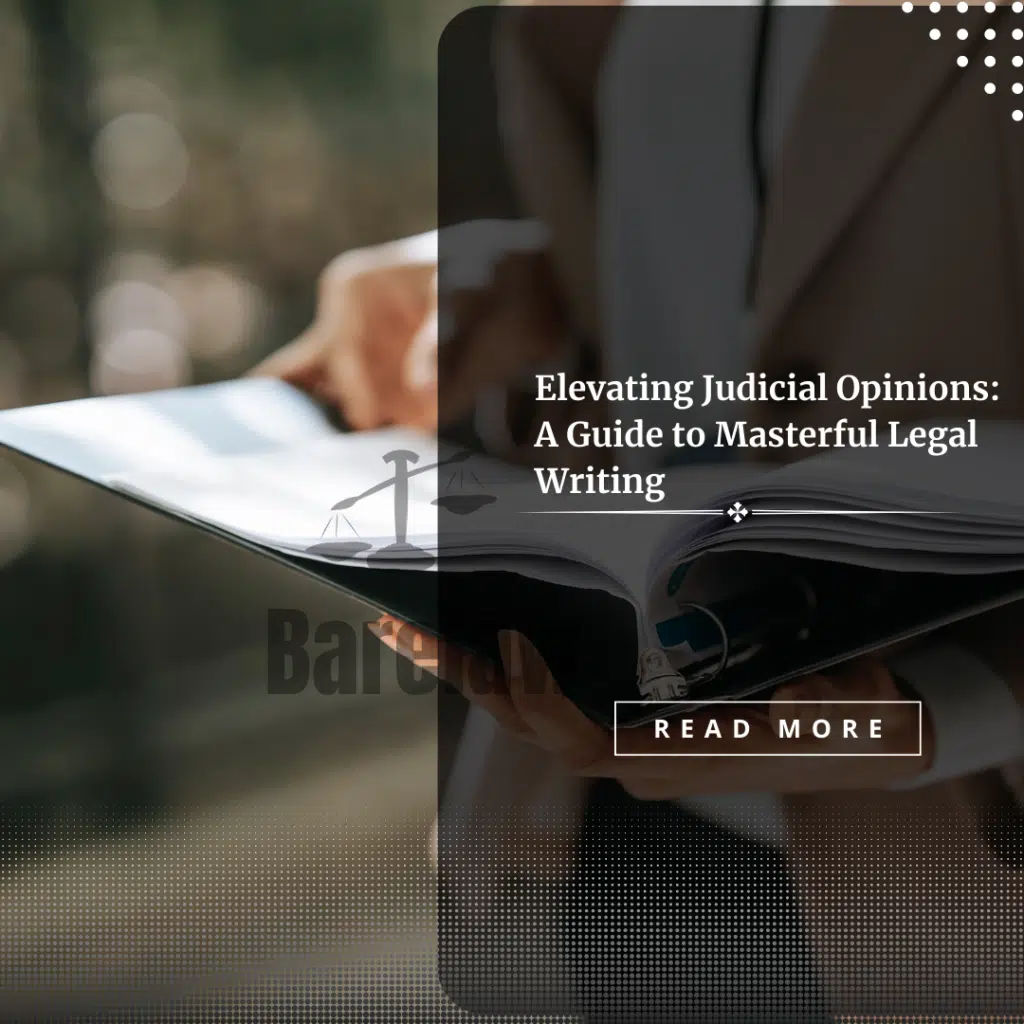
Table of Contents
Elevating Judicial Opinions: A Guide to Masterful Legal Writing
Elevating Judicial Opinions: A Guide to Masterful Legal Writing
A legal opinion of a judge in writing is the law itself because it creates precedents and guides justice. Legal writing is an art that judges must know since it enables them to make decisions that are clear, coherent and persuasive. As such, this manual will offer useful tips and advice for judges who want to improve their skills in legal writing so that they can create impactful opinions.
The Importance of Effective Legal Writing
The judicial process depends on clear and logical legal writing. A well-written opinion explains the judge’s legal reasoning while also serving as an educational tool for practitioners, litigants, and future members of the bench. Below are some ways through which judges can enhance their abilities in legal writing:
- Clarity: Always aim at being clear above everything else. Use simple words devoid of ambiguity when explaining complex ideas within law such as statutes or contracts otherwise your audience may fail to understand what you mean; hence make sure that such sentences do not exist here.
- Organized Structure: Organize your opinion in a manner that makes it easy for one to follow through its contents from start to finish without any confusion whatsoever. This entails employing a logical order which can be achieved by having an introduction section where you briefly state facts leading up to this case before going into details about each point raised under different headings or subheadings.
- Smooth Flow: One thing which separates good essays from bad ones concerns how information flows within them – here everything should move smoothly without any abrupt shifts such as “however” or “but.” In other words, ensure there is linkage between various parts so that readers are taken step after another towards final conclusion reached by court concerning dispute presented before them.
- Avoid Jargon: Although some technical terms used in law cannot be ignored altogether (e.g., ‘mens rea’), still try as much possible not use jargons which may sound strange to non-lawyers. This means striking balance between being technically accurate and keeping your work accessible.
- Brevity: Shorten words where necessary but still ensure complete coverage of all aspects under review – eliminate repetition without omitting relevant facts because this will lead to insufficient treatment of issues involved thereby rendering decision inadequate or even wrong according laws applicable here.
Crafting Persuasive Judicial Opinions
The main purpose of a persuasive judicial opinion is not only presenting legal analysis but also convincing readers about correctness behind judge’s reasoning. Below are tips on how you can achieve persuasive power in your judgments:
- Solid Legal Research: A strong argument is built on a foundation of extensive legal research. Therefore, you should examine relevant statutes, case laws as well as precedents.
- Clear Legal Analysis: The first step towards understanding any complex issue lies in breaking it down into manageable parts; similarly with legal issues too. Henceforth, state your analysis clearly by addressing each component separately before putting them back together again later on if necessary or not at all depending upon what suits best for explanation purposes only – also do not forget about counter arguments!
- Build a Compelling Narrative: Narratives have always been powerful tools used by writers to keep readers engaged till the end thus should never be ignored. You are supposed to tell us a story which connects facts with law and parties’ positions.
- Highlight Key Precedents: Important judgments should not be overlooked when writing an opinion – they can either save time or serve as reference points later during decision making process. So make sure you explain why these cases fit into current scenario plus how are contributing towards arriving at your conclusion\decision\finding etcetera etcetera…
- Use Persuasive Language: A good way of showing people that something really matters such as life or death situation would be through employing strong terms like ‘must’ ‘should’ ‘have to’ etc.. This does not mean one has right go overboard while trying to prove his point but rather authority needs conveyed without sounding weak.
Effective Communication with Stakeholders
Judicial opinions act as link between courts & practitioners hence interface between judiciary and legal community at large.To communicate your decision effectively with people of varying interests, consider doing following:
- Address the Parties: Either party should be addressed directly by name so that they feel recognized and taken seriously. This shows fairness on part of judge who is supposed to be neutral throughout proceedings.
- Educate Practitioners: Teach them principles behind cases; therefore; write an opinion which can help practitioners understand what law says about their conduct or actions when faced with similar contexts in future.
- Guidance for Future Judges: You may not know it but somewhere there will always come another person sitting where you sit right now reading this sentence waiting for guidance from above concerning how best go about interpreting laws or analyzing matters before courts – thus let us make sure our articles are instructive enough for such persons too.
- Transparency: It would greatly improve transparency if judges could disclose reasoning employed while arriving at particular decisions. Such openness enhances credibility of any judgment and enables all stakeholders appreciate logic used by court in reaching its conclusion.
The Editing and Review Process
The quality of a judicial opinion greatly benefits from thorough editing and review. After drafting your initial opinion, consider these steps:
- Review for clarity: You should read your opinion to make sure it is clear. Avoid complex sentence structures and convoluted phrasing.
- Check for consistency: Make sure that the terminology, citation style, and format of the opinion are consistent.
- Peer review: Seek feedback from other judges or colleagues. They may provide a fresh perspective and help identify any potential issues.
- Proofread: Carefully proofread for grammar errors, typos, and inconsistencies in formatting. A polished opinion reflects professionalism.
Conclusion
A written opinion of a judge represents his or her legal wisdom as well as knowledge skills. The improvement on legal writing skill by the judge contributes not only to legal discourse but also to the lives of those affected by their decisions. Mastery in clarity coherence and persuasive power marks good legal writing. With commitment and practice, a judge can sharpen their skills leading to crafting opinions which not only shape law but serve as models for effective communication and reasoning in them



